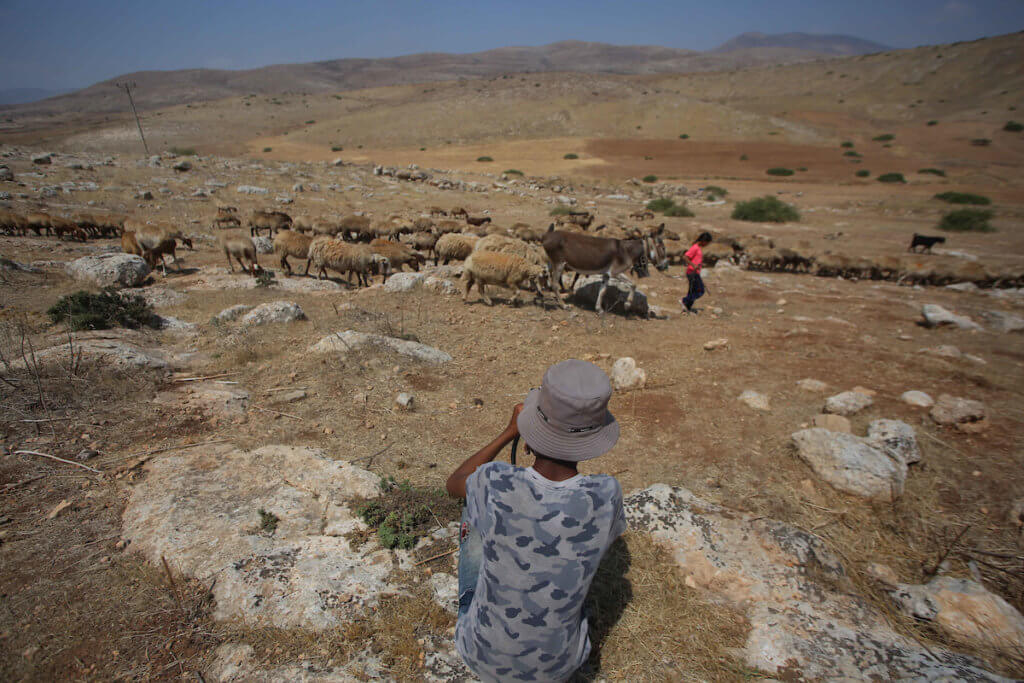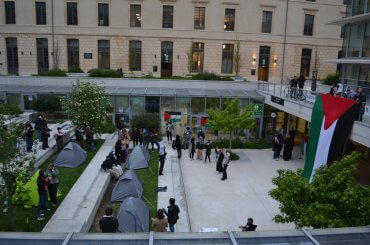The Palestinian people and their leaders are being faced with one of the biggest affronts to their fight for statehood in recent years, as Israel pushes forward with plans to unilaterally annex Palestinian territory.
But while Palestinian leaders are trying to focus their efforts on building international solidarity against Israel’s annexation plan, their hands are being pulled in the opposite direction by another dire crisis.
For the second time, the coronavirus is sweeping across Palestine, with daily infection rates in the hundreds and a rising death toll among COVID-19 patients.
The threat of political disaster and an uncontrollable outbreak are pulling ordinary Palestinian citizens in different directions, with little guidance from the government and leaders as to what the near future might look like.
As of Tuesday, there were over 2,000 active cases of the coronavirus in the occupied West Bank, East Jerusalem, and the Gaza Strip.
The overwhelming majority of cases have been reported in the past two weeks following a severe spike in the virus, following the Eid holidays at the end of May and the subsequent reopening of the West Bank after months of lock down.
Nine Palestinians have died from the virus. The most recent victim died on Tuesday; he was a 44-year-old man from the Hebron district of the West Bank, which has become the epicenter of the current outbreak, with more than 50% of all cases located there.
On Monday, the Palestinian Ministry of Health recorded the highest number of cases in a single day, with 255 cases reported within 12 hours.
Unlike the last outbreak in March, which happened on a significantly smaller scale with mostly asymptomatic cases, this new wave of cases not only seems to be affecting more people, but causing more damage to victims’ health as well.
Official numbers indicate that while most cases are mild, there are 13 people with the virus who are currently in intensive care, three of whom are in critical condition and are hooked up to ventilators.
Getting the virus under control
As the number and severity of COVID-19 cases in Palestine continue to rise, the Palestinian Authority (PA) is scrambling to maintain some sense of control over the virus.
Despite the rapidly changing situation, the government has refrained from enforcing a nationwide lock down in the West Bank, similar to the more than two-month lock down that began back in March.
Instead, the national government has seemingly passed control of the situation over to the individual governorates, who can decide if, when, and how to enforce lock downs in their respective areas.
The Hebron governorate has been under lock down for 10 days, while the Bethlehem governorate announced a two-day closure on Monday and Tuesday.
The short-term closure was meant to buy time for front line workers to get a hold over the spread of the virus, and help teams from the ministry of health to better map out the spread of the virus in the city.
But by the end of Tuesday, local media was reporting that the government could be extending the lock down for another two weeks, leaving thousands of private sector and service workers in limbo.
The national government has given very little indication as to how they plan on addressing the growing crisis, leaving people wondering if they are going to live the next few weeks between temporary short term shut downs, or if they should prepare themselves for another month or two under quarantine.
Annexation up in the air
The growing COVID-19 crisis has done little to stop the PA from pouring its time and resources into anti-annexation efforts.
Nearly every statement, press conference, and declaration coming out of the PA in recent days is focused on annexation, which was planned to be announced by Israeli Prime Minister Benjamin Netanyahu on July 1st.
Palestinian leaders have doubled down on efforts to build international pressure against Israel over annexation, and have maintained their threats to dissolve their own government if the move goes through.
Whether through the work of the PA, international pressure, or internal disputes within the Israeli government, it seems that efforts to delay annexation could be working.
Earlier on Tuesday, less than 24 hours before his self-declared July 1st deadline, Netanyahu indicated a possible delay in annexation after a meeting with US envoys, saying “we will continue to work on [annexation] in the coming days.”
His remarks come amidst a number of reports discussing rifts between Netanyahu and Benny Gantz over annexation, the latter of which has said he believes fighting COVID-19 should be Israel’s priority right now.
Experts seem to agree with Gantz’s position, with a Tel Aviv-based think tank predicting that annexation could spell disaster for both the Israeli and Palestinian economies, which are already suffering from the ramifications of COVID-19 related shut downs.
“Such a confrontation may further exacerbate the economic crisis caused by the corona epidemic, just as the second intifada exacerbated the crisis that accompanied the bursting of the high-tech bubble in 2000,” the Adva Center said of annexation.
Additionally, if the PA decides to relieve itself of its duties and agreements with Israel, Israel would be required under international law to incur the costs of being responsible for Palestinian civilian life, including everything from education to healthcare.
In spite of the growing threat of COVID-19, and little clue as to whether annexation is going to go through on July 1st or not, Palestinians and their supporters around the world are still planning to take to the streets in protest tomorrow against the policy.
Even if Israel does back down tomorrow, it is widely understood that Netanyahu will continue to push annexation, with the hopes of at least beginning the process while his friend Donald Trump is still in the White House.



Meanwhile, around the world, ever increasing numbers of people are standing shoulder to shoulder with the Palestinians. Here’s a typical example just received from a Canadian friend. Check out the site!
http://cpavancouver.org/2020/06/vancouver-support-for-palestine/
EXCERPT:
Canada Palestine Association:
“Vancouver support for Palestine” June 27/20
“For over an hour on June 26th, the intersection of Broadway and Clark in Vancouver became a ‘little piece of Palestine’. At the peak of rush hour, committed activists with great signs and Palestinian flags took first to the 4 corners of the intersection and then formed a block-long human chain of #NoAnnexation messages. Most noteworthy was the reaction from both the passing cars and pedestrians in the area. The honks and waves from vehicles, be they buses, trucks or cars, was overwhelming and far exceeded previous levels of support in past years. Folks going by on foot stopped to talk and show solidarity. People in Vancouver, and all across Canada, are clearly on-board with Palestinian rights; the disconnect from the Canadian government and major political parties not only misrepresents the public sentiment, it is shameful!”
Poll after poll has determined that the vast majority of Canadians are pro-Palestinian..